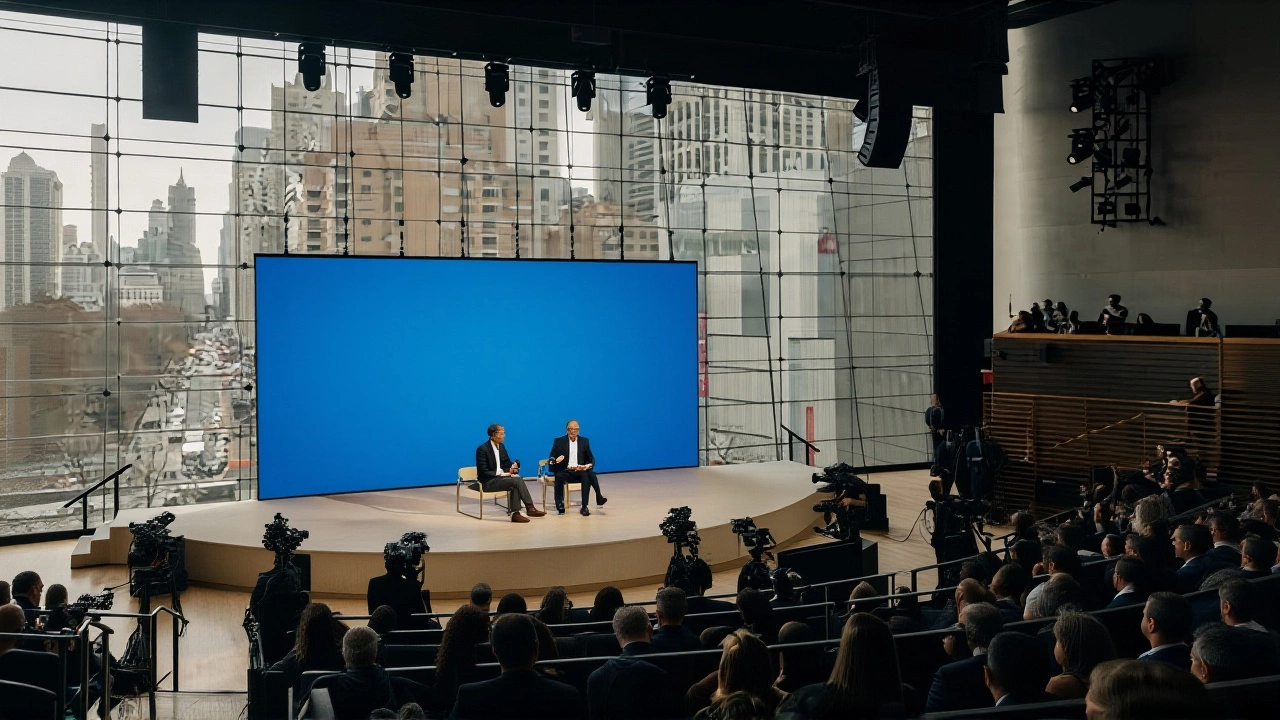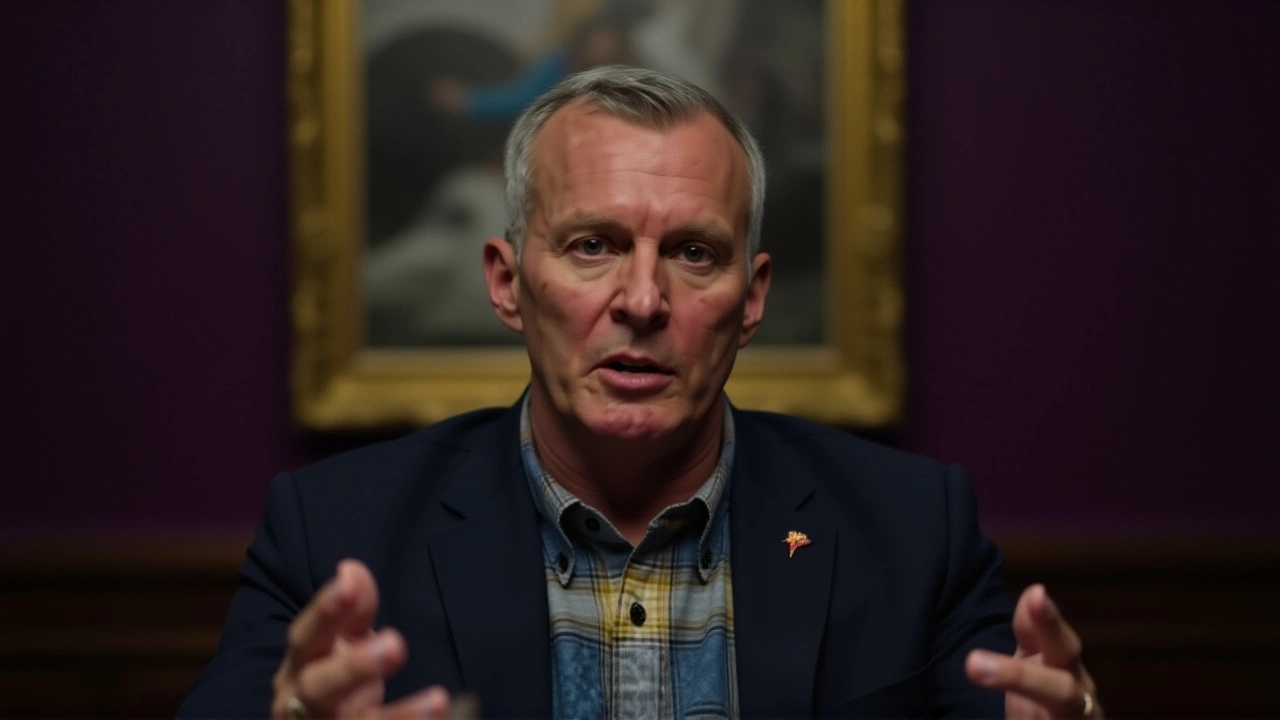David Ellison, Scott Bessent, Erika Kirk Lead Star-Studded DealBook Summit 2025
 Nov, 24 2025
Nov, 24 2025
On December 3, 2025, the business world turns its eyes to Jazz at Lincoln Center in New York City, where the DealBook Summit will gather the most powerful voices in finance, tech, government, and culture — all under the watchful eye of Andrew Ross Sorkin, the The New York Times columnist who turned a newsletter into a defining event of modern business journalism.
Who’s Really in the Room?
This year’s mainstage lineup reads like a who’s who of power. David Ellison, chairman and CEO of Paramount Skydance Corporation, arrives amid a brutal restructuring that saw 1,600 employees cut in recent weeks. His presence isn’t just symbolic — it’s a test of how corporate leaders navigate public scrutiny during downsizing. Meanwhile, Scott Bessent, the newly appointed United States Treasury secretary, will speak as the architect of fiscal policy during a period of high inflation and political polarization. And then there’s Erika Kirk, CEO and chair of Turning Point USA, a conservative youth organization whose influence has grown beyond campus rallies into mainstream media.Joining them: Dario Amodei of Anthropic, the AI firm betting big on safety-first models; Brian Armstrong of Coinbase, still fighting regulatory headwinds; Mary Barra of General Motors, steering the auto giant’s electric transition; and Larry Fink of BlackRock, whose $10 trillion empire shapes global markets.
Even Hollywood isn’t absent. Halle Berry, founder of Respin Health, will discuss the intersection of entertainment and healthcare innovation. And Meredith Whittaker, president of Signal, will likely face tough questions about encryption, government pressure, and the future of private communication.
The Hidden Conversations
While the mainstage draws headlines, the real meat lies in the closed-door task forces — discussions with experts on AI regulation, supply chain resilience, and the future of work. These aren’t open to attendees. They’re not even recorded. But The New York Times will publish a special section dissecting their findings, and the DealBook podcast will release episodes in the following days. That’s the magic trick: influence without transparency.It’s a pattern. The summit doesn’t just report the news — it helps write it. Last year, conversations about crypto regulation here directly preceded the SEC’s crackdown on major exchanges. In 2023, talks on AI ethics preceded the White House’s executive order on algorithmic accountability. This year? Expect the same. With Alex Karp of Palantir in the room — a company whose software has been used by U.S. intelligence and immigration enforcement — questions about surveillance capitalism won’t stay buried.
Why This Matters Beyond Wall Street
This isn’t just a conference for billionaires and CEOs. It’s a mirror. When David Ellison sits down to talk about “streamlining operations,” what he’s really saying is that streaming wars are over — and the losers are the people who made the content. The 1,600 layoffs at Paramount? They’re not just corporate math. They’re the human cost of a media landscape collapsing under debt and fragmentation.And when Erika Kirk speaks, she’s not just addressing college students. She’s shaping a political movement that’s already influenced state legislatures, school boards, and now, potentially, federal policy. Her presence signals how deeply conservative activism has penetrated elite business circles — a shift that would’ve been unthinkable a decade ago.
Meanwhile, Scott Bessent’s appearance is a political signal. He’s not here to sell bonds. He’s here to reassure markets — and the public — that the administration’s economic strategy has teeth. With the 2026 midterms looming, this summit might be one of his first major public tests.

What’s Next?
The DealBook Summit doesn’t end on December 3. Its real impact unfolds over the next 30 days. Watch for: a surge in media coverage linking AI ethics to federal funding; a spike in congressional inquiries about Palantir’s government contracts; and a fresh wave of investor skepticism around Paramount’s restructuring plan. The summit doesn’t just reflect power — it redistributes it.And don’t overlook the quiet players. Hemant Taneja of General Catalyst has backed over 50 health tech startups. Gary Vaynerchuk of VaynerX understands how Gen Z consumes news. Their insights might be the quietest, but they’re the ones that will ripple into your feed, your wallet, your vote.
Frequently Asked Questions
How does David Ellison’s leadership at Paramount affect the broader media industry?
Ellison’s decision to cut 1,600 jobs at Paramount reflects a brutal industry-wide reckoning. Streaming platforms, once seen as growth engines, are now under pressure to turn profits. This signals a shift from content saturation to cost control — a trend that could lead to more layoffs at Warner Bros. Discovery, NBCUniversal, and even Netflix. The result? Fewer original shows, more reboots, and less creative risk-taking.
Why is Scott Bessent’s presence at the summit politically significant?
As Treasury secretary, Bessent is the face of economic policy during a volatile time. His appearance at a private business summit — rather than a public hearing — suggests the administration is prioritizing market confidence over transparency. Investors will be watching for subtle cues on interest rates, tax policy, and debt management. His words here may shape Wall Street’s expectations before any official announcement.
What role does Turning Point USA play in shaping business discourse?
Under Erika Kirk, Turning Point USA has moved beyond campus activism into boardrooms and media networks. Its influence is visible in corporate opposition to DEI initiatives and support for school choice policies. Companies like Disney and Nike have faced pressure from TPUSA-aligned donors. At the DealBook Summit, Kirk’s presence signals that conservative ideology is no longer sidelined — it’s a force shaping corporate governance and investor priorities.
How will the closed task forces impact public policy?
Though not open to the public, the task forces feed directly into The New York Times’ reporting. Past sessions have influenced SEC rulings on crypto, FDA guidelines for AI diagnostics, and even state-level antitrust actions. This year’s discussions on AI governance and supply chain security could become the basis for congressional hearings in early 2026 — quietly shaping laws before the public even knows they’re being debated.
Is the DealBook Summit still relevant if only elites attend?
Yes — because influence flows upward and downward. The decisions made in those rooms determine who gets funding, who gets regulated, and what stories get told. When BlackRock’s Larry Fink speaks on climate risk, pension funds adjust their portfolios. When Signal’s Meredith Whittaker warns about surveillance, app developers rethink their architecture. The summit doesn’t need the public in the room — it just needs them to read about it later.
What’s the connection between this summit and the 1929 crash mentioned in Andrew Ross Sorkin’s new book?
Sorkin’s book frames today’s volatility through the lens of 1929 — a time when financial elites, media, and government misread warning signs. The DealBook Summit, in many ways, is the modern version of the private gatherings that preceded the crash: exclusive, insulated, and filled with people who believe they’re steering the ship. The question now is whether they’re seeing the icebergs — or pretending they’re still in calm waters.